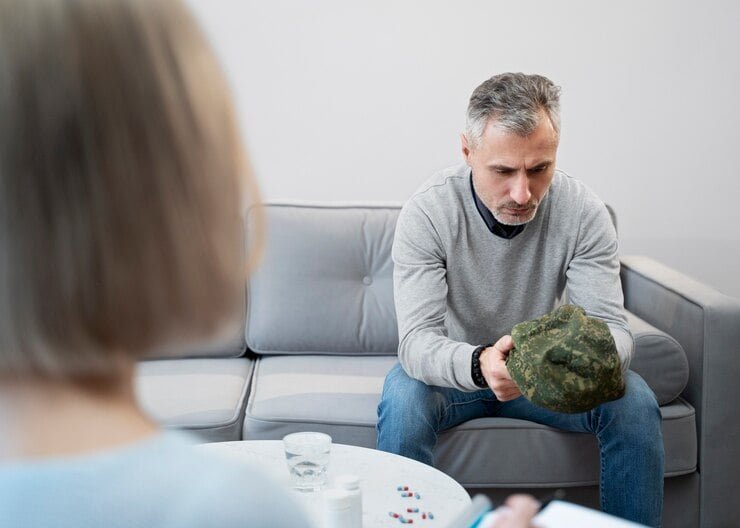
Psychosocial rehabilitation (PSR) is also a type of therapy that helps people with severe mental illnesses, such as schizophrenia or bipolar disorder, to regain power over their lives. Recovery-oriented, PSR helps individuals to overcome their condition to a place where they can have control over their life and ensure integration in the society.
This skills-focused, strengths-based and community-centered evidence practice supports individuals to learn how to manage symptoms and improve their lifetime experience and works with people towards their personal goals.
Described as an essential element in mental health services by the World Health Organization (WHO), PSR has a lot to offer for increasing personal well-being and long term recovery. In this blog, let us dive deeper into the basic principles of psychosocial rehabilitation and how it helps individuals facing grave mental health issues.
What is Psychosocial Rehabilitation?

Psychosocial rehabilitation (also termed psychiatric rehabilitation or PSR) helps in restoring personal recovery, reintegration into the community and a quality life among persons with mental illness and mental health concerns. Psychosocial Rehabilitation is client-centered, proactive and personalized services and supports which are also critical in the provision of public human services.
They are concerned on enhancing the capacity of individuals in terms of skills and resources that they require to achieve their goals and satisfying conditions in the environments of their choice such as living, working, learning and social activity and entail multiple levels of services and supports.
PSR approaches include Employment, Education, Leisure, Wellness and Basic Living Skills, Family Involvement and Peer Support and Peer Delivered services, all of which are Evidence Based Best and Promising Practices. In view of the recovery nature of these methods and their proven efficacy, any person who has long term psychosis and/or substance abuse must have access to the methodologies.
How Does PSR Work?
The primary objective of psychosocial rehabilitation (PSR) is to assist individuals with debilitating mental illnesses by addressing their specific needs of care to return to a normal life. The present stage encompasses the evaluation steps where a multidisciplinary team, typically including psychiatrists, psychologists, social workers and occupational therapists, considers the problem, skills and strengths of the person. On the basis of this assessment, an individualised care plan with recovery objectives is developed.
In the case of the PSR program, some of its components include provision of individual and group therapeutic interventions, skills teaching, and case management. These aim to improve customer coping, sociability, and self-management to help the people live quality lives and adopt to their environments better.
Goals of PSR
Regaining daily living skills
Regaining daily living skills may pose a burden in individuals with severe mental disorders as they may even need assistance in performing simple tasks including cooking, cleaning, and managing funds. PSR has been helpful in helping them reclaim these skills by teaching, training, as well as providing assistance.
Enhancing social relationships
Individuals with severe mental illness are often faced with social isolation. In most cases, the opponents of these programs are able to provide social activities to the individuals aimed at making proper social networks.
Improving employment and education outcomes
The subject of employment in the severe mentally ill groups is grievously underanswered and off the subjects radar with unemployment rates amongst this group being alarming vis a vis general population statistics. The disabled individuals face insurmountable challenges concerning employment, but PSR programs will assist the individuals to acquire some occupational skills to seek for employment, or further studies.
Promoting community integration
PSR also has an approved objective of encouraging individuals with mental illness to become active participants in their society. Some of these objectives are getting accommodation, going to college, or centers of activity, associating and volunteering, or being engaged in active search for work.
Who Can Benefit From Psychosocial Rehabilitation?

Psychosocial Rehabilitation (PSR) positively influences those suffering from mental health sicknesses who need help in addition to the regular treatment they receive. Whereas some people will return to their optimal functioning with medication and therapy some require PSR in order to be able to live on their own and prosper.
Some of the groups of people that would benefit from PSR are people who are coming off treatment and who require assistance achieving the optimal levels of function they could have, people who have disability issues and who have to be assisted in various activities of everyday living, people who wish to gain more from life and seek help in doing so.
People suffering from chronic disabilities or severe mental illnesses can also benefit from PSR because it helps them to acquire important skills and knowledge such as life skills, social skills and self-care skills which are necessary for coping and effective functioning. Further, patients recovering from acute episodes of health crises may find it utmost beneficial to incorporate PSR in restoring their career prospects, living opportunities and personal relationships thereby enhancing their wellbeing.
Conclusion
Psychosocial Rehabilitation (PSR) acts as a bridge to support people suffering from severe mental disorders in their journey to an independent life within society. It enables such individuals to utilize the personal resources focused on their individual recovery by enhancing their competencies or assisting in their social inclusion. It attends to areas such as self-care, relationship building, finding work, and going back to school, all of which form a lot of the skills that help recuperation and exploitation of one’s health.
For such people suffering from severe mental illness or these who are recovering from the acute episodes, A psychosocial rehabilitation strategy focuses on rehabilitation and development of patients to bring about ease in their day to day activities, hence giving them a comfortable and productive situation. On the other hand, PSR improves the quality of mental healthcare through long-term recovery focusing strategies.